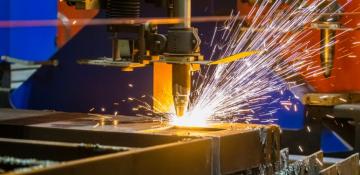
George Osborne’s Autumn Statement in November gained most column inches for the apparent U-turn on tax-credit reforms proposed just four months earlier.
But what did Osborne have to offer businesses – and manufacturers in particular?
Prior to the Chancellor’s speech, EEF – the manufacturing industry body – set out an Autumn Statement wish list.The EEF said it wanted reassurances on the government’s support for manufacturers’ investment in innovation; it also asked for the burden of higher gas and electricity costs among energy-intensive manufacturers to be recognised.
The EEF additionally stressed that ministers should continue to offer their backing for export body UK Trade and Investment – this was particularly pertinent given a recent report from the CBI which found that British manufacturing exports were at their lowest level in almost three years.
The good news is Osborne’s speech went a long way to dealing with most of these points.
Support for innovation
The Chancellor added that the government would continue to support the Catapult network of research and development centres and their parent body, Innovate UK. These organisations connect companies with leading researchers and academics to formulate innovative solutions to business problems as well as to develop new products.
The EEF’s Chief Economist Lee Hopley, said, “Keeping the funding for Catapult centres on a stable footing is great news for innovative businesses across the UK. “The priority now is to keep the existing centres at the cutting edge of technology and expand the network as and when additional resources become available.”
Exemptions from energy costs
Osborne also revealed that firms in energy-intensive sectors would be given exemptions from the costs arising from two environmental policies – the renewables obligation and feed-in tariffs. Gas and electricity suppliers are obliged to pass these levies on to customers, but from 2017 the likes of steel manufacturers will no longer face these charges.
Gareth Stace, director of UK Steel, said, “This is an extremely positive development. Ever since the Chancellor committed to a compensation package for the costs of renewables support at the 2014 Budget, there has been a significant element of uncertainty regarding its scope, adequacy and longevity.
“With a move to an exemption rather than compensation, government has ended this uncertainty and we can now look forward to a more level playing field in terms of energy prices for our steel plants.”
Cuts to export body
In his speech, Osborne said there would be a “refocus” of UK Trade and Investment (UKTI). In fact, the agency’s budget will be cut over the next four years: the current annual spend is £299 million, and this will fall to £277 million a year by 2019-20. This is despite a downgrade in the Office of Budget Responsibility’s forecast for UK export growth in 2015: the OBR now expects total exports to increase by 3.4% this year rather than the 3.8% predicted at the time of the summer Budget in July.
But Allie Renison, head of EU and trade policy at the Institute of Directors, said that a more streamlined approach by UKTI was overdue.
“While there is some contradiction between the government committing to such an ambitious exports target and continuing to chip away at UKTI’s budget, we welcome the focus on reforming and refocusing UKTI to deliver more targeted value-add activity for business.
“Not all of UKTI’s services have always been value-for-money in terms of business take-up, so concentrating on the practical needs of enterprise to expand abroad is vital.”
Speaking to the BBC this week, Lee Hopley at EEF said manufacturers are ending 2015 in a downbeat mood.
She said the collapse in the oil price, slower world trade growth and weaker-than-expected construction activity had all contributed to weaker manufacturing activity.
Hopley added that the chancellor's recent Spending Review had some "positive" policies for industry, but it was important the government continued to act to ensure the UK was a competitive location for manufacturing.
Takeaways:
- The collapse in oil price, slower world trade growth and weaker-than-expected construction activity have all contributed to challenges for the manufacturing industry.
- The Autumn Statement promised continued support for innovation and R&D.
- Manufacturers in energy-intensive sectors like steel will be exempt from certain levies.
- The government needs to continue to support manufacturers to ensure the UK is a competitive location for trading.
Take a look at our latest infographic: SMEs face finely balanced EU decision






